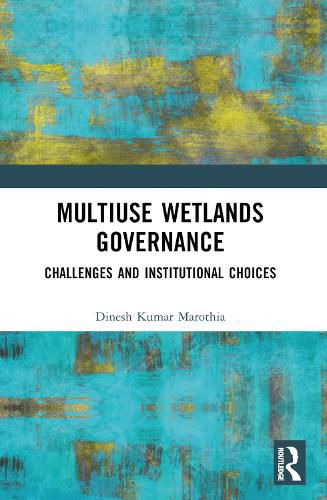Readings Newsletter
Become a Readings Member to make your shopping experience even easier.
Sign in or sign up for free!
You’re not far away from qualifying for FREE standard shipping within Australia
You’ve qualified for FREE standard shipping within Australia
The cart is loading…






The Ramsar Convention was established in 1971 to ensure the conservation and wise use of wetlands across the world. India joined the Convention in 1982, however, in the past 50 years, despite Ramsar's incredible achievements, the threat to wetlands across the globe, including India, has not diminished. This book studies the governance of multiuse wetlands in India.
The volume provides an exhaustive analysis of rural, peri-urban, and urban human-made wetlands to establish the relevance of institutional design and the effective role of authority in governing multiuse wetland ecosystem services. The author argues that the most challenging task in governing wetlands is to frame institutional choices that users and non-users comprehend, and agree to pursue under alternative property rights regimes.
Drawing on extensive fieldwork, the book provides a broad look into the causes and consequences of wetland ecosystem degradation and offers insights into improved sustainable management systems for different types of multiuse wetlands. It will be indispensable for students and researchers of environmental studies, sustainable development, biodiversity, conservation, and agricultural, natural, and environmental resource economics.
$9.00 standard shipping within Australia
FREE standard shipping within Australia for orders over $100.00
Express & International shipping calculated at checkout
The Ramsar Convention was established in 1971 to ensure the conservation and wise use of wetlands across the world. India joined the Convention in 1982, however, in the past 50 years, despite Ramsar's incredible achievements, the threat to wetlands across the globe, including India, has not diminished. This book studies the governance of multiuse wetlands in India.
The volume provides an exhaustive analysis of rural, peri-urban, and urban human-made wetlands to establish the relevance of institutional design and the effective role of authority in governing multiuse wetland ecosystem services. The author argues that the most challenging task in governing wetlands is to frame institutional choices that users and non-users comprehend, and agree to pursue under alternative property rights regimes.
Drawing on extensive fieldwork, the book provides a broad look into the causes and consequences of wetland ecosystem degradation and offers insights into improved sustainable management systems for different types of multiuse wetlands. It will be indispensable for students and researchers of environmental studies, sustainable development, biodiversity, conservation, and agricultural, natural, and environmental resource economics.